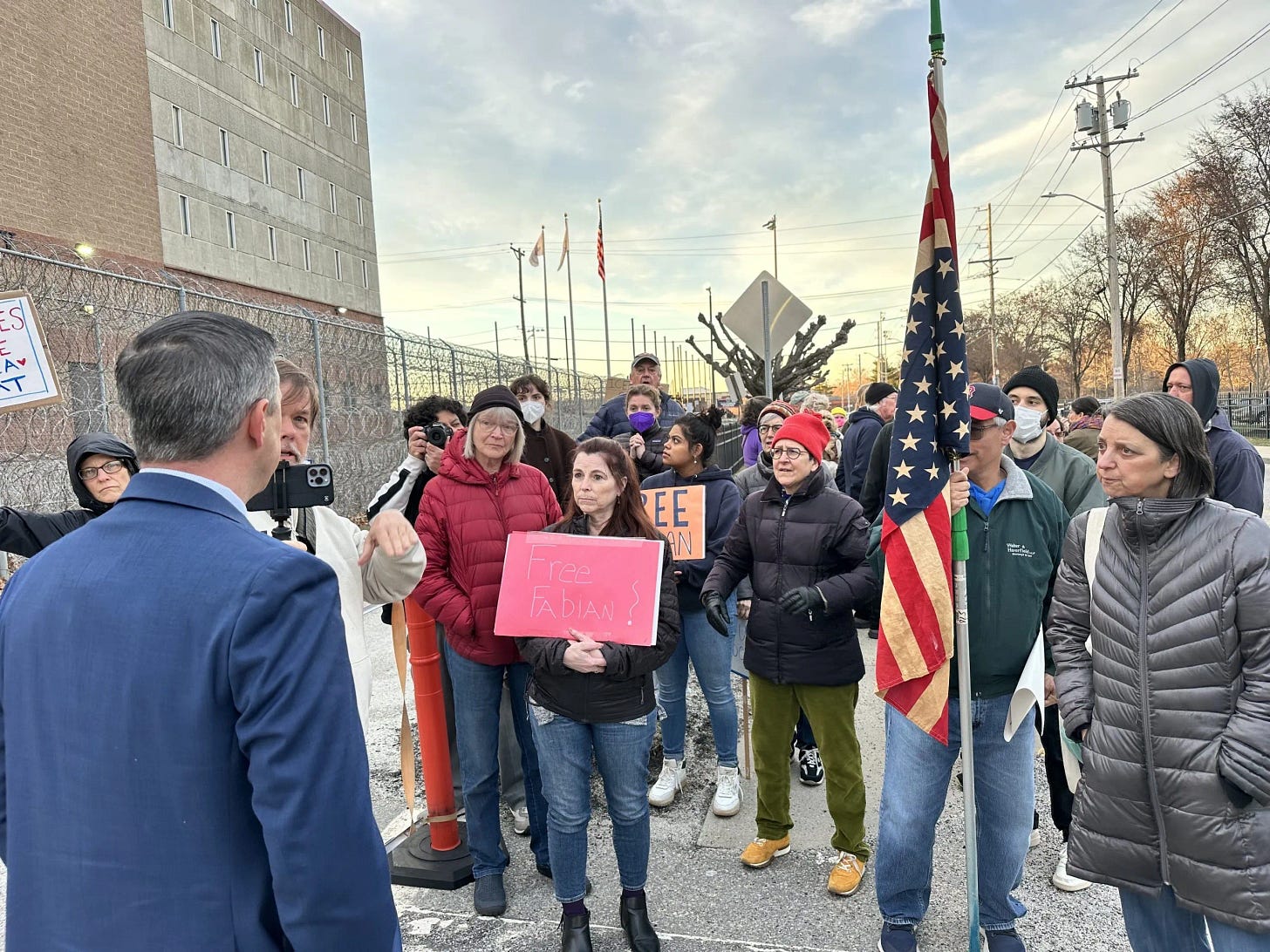“It probably never crossed Fabian Schmidt’s mind that he wouldn’t breeze through security at Boston’s Logan Airport. A legal resident of New Hampshire, he flew back to the United States on March 7 after a visit to Luxembourg, but never made it through security. According to his mother, who didn’t get to speak with him until four days later, Schmidt was ‘violently interrogated’ for hours, stripped naked, and forced into a cold shower. Given little food or water, suffering from sleep deprivation, and prevented from taking anxiety and depression medication, he collapsed and was hospitalized (where he learned he also had the flu), she said. Schmidt is now reportedly locked up in an Immigration and Customs Enforcement detention center in Wyatt, Rhode Island. Schmidt is not your usual profile of an immigrant subjected to alleged abuse by U.S. immigration authorities. A 34-year-old German national with a green card since 2008, he’s an electrical engineer whose partner, a cardiologist, is a U.S. citizen; they have an 8-year-old daughter. Schmidt’s mother said his green card had been flagged, possibly over a since-dismissed misdemeanor for marijuana possession in California. His case, along with a growing list of other examples, shows how large a role discretion plays in the immigration system—and how that discretion appears to be changing drastically under the second Trump administration, as emboldened authorities throw the book at and even abuse those who once could consider themselves relatively protected.” (Felipe de la Hoz/TNR)
“The Pentagon was scheduled on Friday to brief Elon Musk on the U.S. military’s plan for any war that might break out with China, two U.S. officials said on Thursday … Whatever the meeting will now be about, the planning reflected the extraordinary dual role played by Mr. Musk, who is both the world’s wealthiest man and has been given broad authority by Mr. Trump. Mr. Musk has a security clearance, and Mr. Hegseth can determine who has a need to know about the plan. Mr. Hegseth; Adm. Christopher W. Grady, the acting chairman of the Joint Chiefs of Staff; and Adm. Samuel J. Paparo, the head of the military’s Indo-Pacific Command, were set to present Mr. Musk with details on the U.S. plan to counter China in the event of military conflict between the two countries, the officials said. The meeting had been set to be held not in Mr. Hegseth’s office — where an informal discussion about innovation would most likely take place — but in the Tank, a secure conference room in the Pentagon, typically used for high-level meetings of members of the Joint Chiefs, their senior staff and visiting combatant commanders. Operational plans for major contingencies, like a war with China, are extremely difficult for people without extensive military planning experience to understand. The technical nature is why presidents are typically presented with the broad contours of a plan, rather than the actual details of documents. How many details Mr. Musk had wanted or expected to hear was unclear … It was unclear what the impetus was for providing Mr. Musk such a sensitive briefing. He is not in the military chain of command, nor is he an official adviser to Mr. Trump on military matters involving China.” (NYT)
“Donald Trump is not the first Republican to try to abolish the Department of Education. Ronald Reagan campaigned on the idea and tried repeatedly to shut the department down. However, the idea was always too unpopular and controversial to go anywhere. Reagan didn’t have sufficient political capital to move the ball forward even after winning 525 electoral votes in 1984. Newt Gingrich resuscitated the idea in the 1990s. Abolishing the Department of Education was part of his Contract for America policy agenda that fueled the Republicans taking over the House for the first time in 50 decades. Once again the Republicans failed. In fact, abolishing the Department of Education became so associated with the Republican’s extreme policy agenda that, in 2000, George W. Bush proposed increasing funding for education as part of his No Child Left Behind initiative. Here we are 25 years later, and Trump is becoming the latest Republican to stick his hand into the meat grinder.” (Dan Pfeiffer/The Message Box)
“Wolf Hall was one of the year’s biggest artistic triumphs when it premiered in 2015. In addition to generating huge ratings in both Britain and America, the BBC-PBS adaptation of Hilary Mantel’s Booker Prize–winning novels scored near-universal critical acclaim, a Peabody Award, Golden Globe and BAFTA wins for Best Limited Series, and no less than eight Emmy nominations. To some, it might seem surprising that a six-hour period drama about the political machinations of Thomas Cromwell and Henry VIII in 16th-century England would end up such a smashing success — and lead to an equally acclaimed follow-up, The Mirror and the Light, which premieres in the U.S. this Sunday on Masterpiece. But for Wolf Hall executive producer (and former HBO Films chief) Colin Callender, the show’s success was just a case of history repeating itself.” (Josef Adalian/NYM)

“The U.S. is making progress against one of its most devastating public-health threats: drug overdoses. Over the 12 months ended in October 2024, the country saw a 25% decline in overdose deaths compared with the same period the year prior, according to the latest preliminary estimates from the Centers for Disease Control and Prevention. About 82,000 overdose deaths were reported. The leading factor? A falling number of fatalities involving synthetic opioids, a drug class in which bootleg fentanyl is the big killer. Those numbers are still significantly higher than they were a decade ago, reflecting just how deadly the drug crisis has become in the fentanyl era. Unintentional drug overdose death rates tripled from 2003 to 2019, according to data published Thursday by the CDC, surpassing the death rate from motor-vehicle traffic and becoming the leading cause of unintentional injury deaths. The drug overdose death rate jumped another 58% from 2019 to 2022, as the Covid-19 pandemic exacerbated an already out-of-control crisis. Then, the rate declined 4% from 2022 to 2023. The early 2024 data shows a continued drop. Part of the shift could be a return to pre-Covid rates as the world has normalized. But researchers don’t fully know why it is happening and suspect changes in policies and drug use are also at play. The decline is at least in part due to a drop in opioid use. A 2022 report found that opioid-use disorder increased from 2010 to 2014, then stabilized and slightly declined each year thereafter.” (Julie Wernau and Brianna Abbott/WSJ)
“This week, Wired announced that it will drop its paywall for any reporting based on the Freedom of Information Act, following the lead of outlets like 404 Media that also make their FOIA-based reporting available for free. The Freedom of the Press Foundation (where Katie Drummond, Wired’s global editorial director, serves on the board) urged other publications to follow suit. ‘Some may argue that, from a business standpoint, not charging for stories primarily relying on public records automatically means fewer subscriptions and therefore less revenue. We disagree,’ the foundation wrote in a statement. ‘It’s just as possible that readers will recognize this sacrifice and reward these outlets with more traffic and subscriptions in the long run.’ Given the apparent efforts by the Elon Musk–run Department of Government Efficiency (DOGE) to evade scrutiny under FOIA, moves that enable important accountability journalism based on records requests to reach more readers can only be welcomed. (A judge ruled last week that DOGE is likely subject to FOIA, as Sarah Grevy Gotfredsen reported for CJR.) And if crucial investigations by Wired—which has done some of the best reporting on Musk and DOGE over the past few months, an exciting pivot for a publication traditionally focused on tech—can be read paywall-free, it could bring more attention to Wired itself, as well as encourage other outlets to copy its move.” (CJR)
“Archaeologists in Egypt have discovered the royal tomb of an unknown king who ruled the region during a tumultuous time 3,600 years ago. The tomb was found within an ancient Egyptian necropolis in Abydos. The burial is located about 23 feet (7 meters) underground and contains a limestone burial chamber covered with mudbrick vaults, the Egyptian Ministry of Tourism and Antiquities wrote in a statement. The burial chamber was originally about 16 feet (5 m) high. The king's reign dates to the ‘Second Intermediate Period’ (circa 1640 to 1540 B.C.), when northern Egypt was ruled by a group called the Hyksos and the southern part of Egypt was controlled by multiple Egyptian kings. Abydos, in central Egypt, would have been ruled by an Egyptian king. But the name of the newfound tomb's owner is unknown. ‘The king's name was originally recorded in painted scenes on plastered brickwork that decorated the underground entrance to the limestone burial chamber,’ said Josef Wegner, a professor of Egyptology and Egyptian archaeology at the University of Pennsylvania who led the team. ‘However, the hieroglyphic texts were damaged by ancient tomb robbers and not enough survives to read the king's name.’ The grave robbers sacked the tomb, and didn't leave any remains of the king's mummy or sarcophagus behind, Wegner said. Archaeologists are still investigating the area where the tomb was found, he added. The area ‘may yield more royal tombs of the same era [which] could shed light on identity and ownership of this new royal tomb,’ Wegner told Live Science in an email.” (Owen Jarus/LiveSciece)
“President Donald Trump has threatened to take down Rep. Thomas Massie before. Now he’s trying again, at the peak of his power in the GOP — and might even succeed this time. It all depends on how much effort Trump and his allies want to put into finding a worthy opponent for the Kentucky Republican congressman — and whether it’s worth the effort ahead of a 2026 midterm campaign that will surely threaten Republicans’ control of the House. Massie provoked Trump last week by casting the lone Republican vote against the party’s government funding plan, sending the president to social media to declare that ‘HE SHOULD BE PRIMARIED.’ Since then, Trump’s former co-campaign manager has taunted Massie, as the eccentric yet popular Kentuckian revealed his fundraising totals have spiked.” (Kadia Mora/SEMAFOR)
“In Nigeria his name has become synonymous with traveler, but it does have a literal meaning: Àjà—one who fights; lá—to tire out. Àjàlá, his surname by birth, dubs him a fighter who wears his opponents down. Only once in the book does his name turn literal. In Egypt he learns of a country club which refuses to admit Black people and he decides he must go and see it for himself. The entrance guards—Àjàlá notices they are unarmed—are short work for a man with a moped. He’s in. He asks for a drink and is told that they don’t serve anyone who isn’t European. He asks to see the manager and someone smashes a plate over his head from behind. Before he’s beaten unconscious and arrested, he fights his way to the kitchen and arms himself: ‘I helped myself to a stack of plates and dishes, and tossed them at my attackers. I did not spare any cases of beer, whisky and soft drink I could lay my hands on … I made sure I did a good job of damaging the crockery.’ More so than in the actual substance of his narrative, which his remarkable photos with Nasser and Nehru edge towards plausibility, there’s something unreal, something of the cartoon character or video game avatar in how things just bounce off Àjàlá. Not just the violence, but the racismo as well. In Moscow a little girl touches his skin to see if the color will come off, then bursts into tears. For Frantz Fanon in Black Skin, White Masks, a moment like this is the source a of a major psychic rupture. By Àjàlá’s account, he forgets it immediately after it happens.” (Toye Oladinni/ The Paris Review)
“President Donald Trump gave no specific reason for firing Gen. Charles Q. Brown Jr. as the chairman of the Joint Chiefs of Staff less than halfway through Brown’s four-year term in office. Nor did he give an explanation for similarly ousting other senior military leaders, including the only women ever to lead the Navy and the Coast Guard, as well as the military’s top three lawyers – the judge advocates general of the Army, Navy and Air Force. The president is the commander-in-chief of the U.S. armed forces. But since the days of George Washington, the military has been dedicated to serving the nation, not a specific person or political agenda. I know this because I served 36 years in the U.S. Air Force before retiring as a major general. Even now, as a lecturer in history, national security and constitutional law, I know that nonpartisanship is central to the military’s primary mission of defending the country. Trump’s actions could raise concerns about whether he is trying to change those centuries of precedent. If so, military personnel at all levels would face a crucial question: Would they stand up for the military’s independent role in maintaining the integrity and stability of American democracy or follow the president’s orders – even if those orders crossed a line that made them illegal or unconstitutional?” (Samuel C. Mahaney/ The Conversation)





